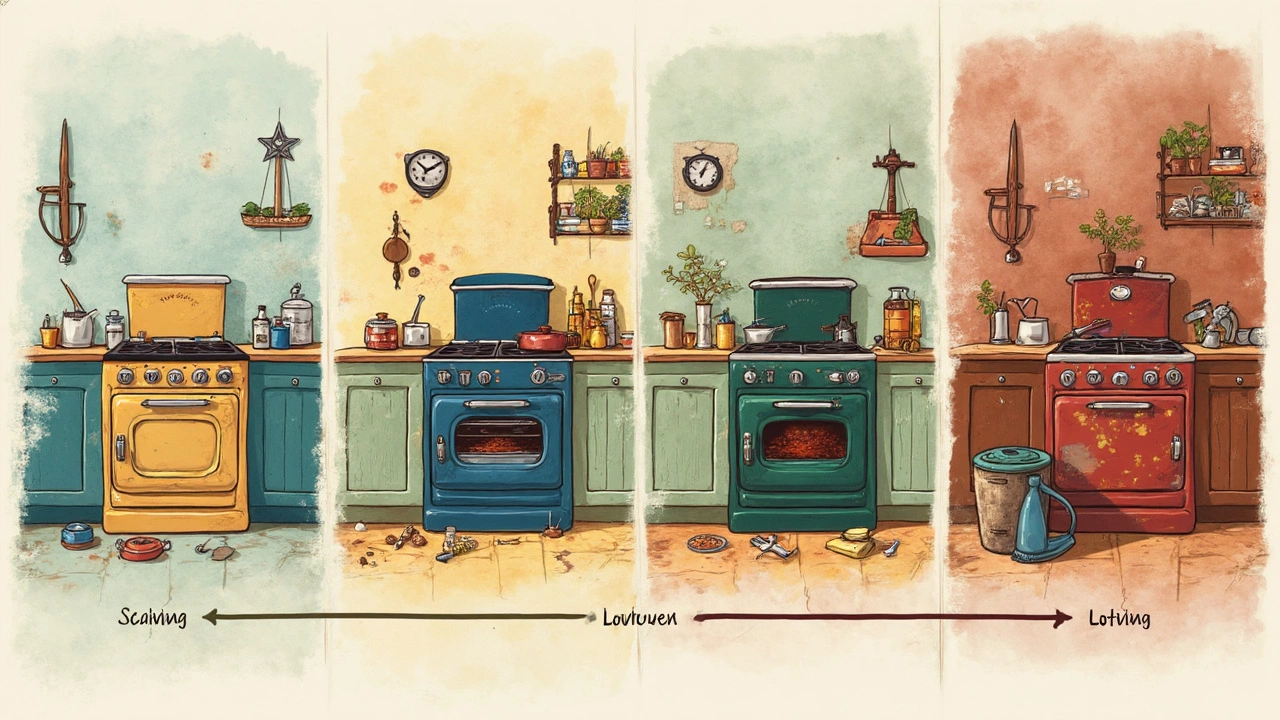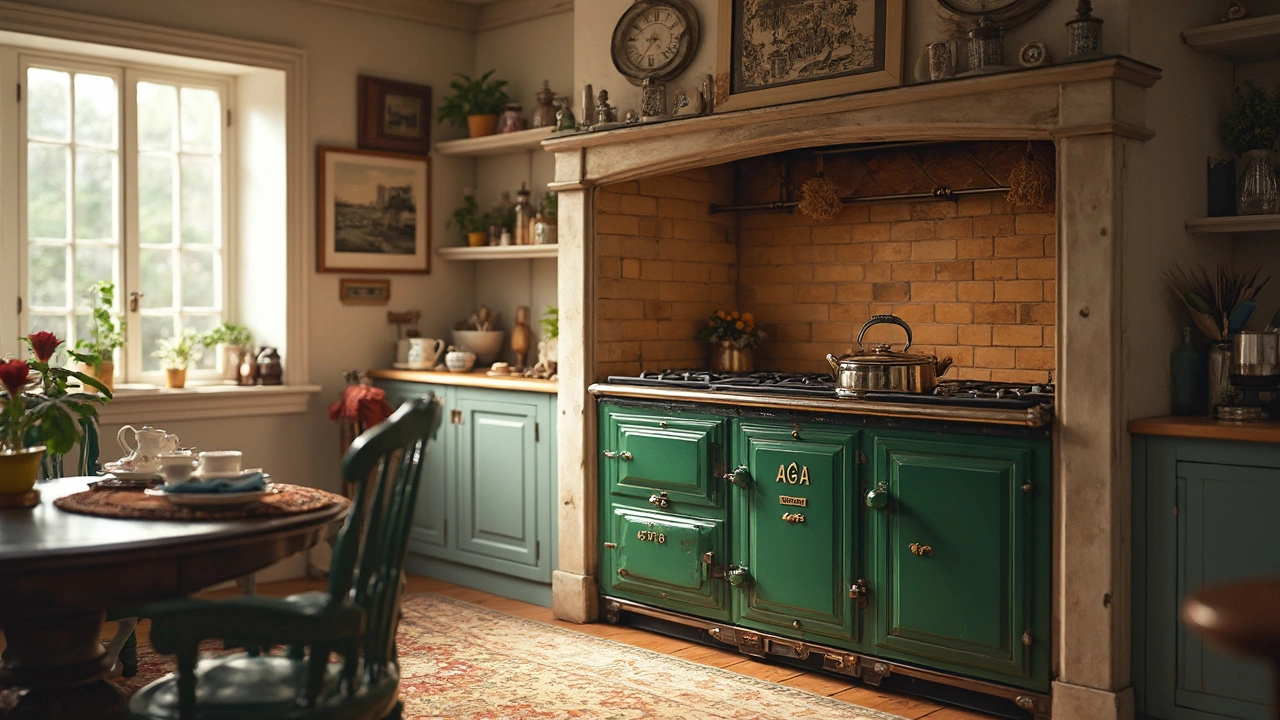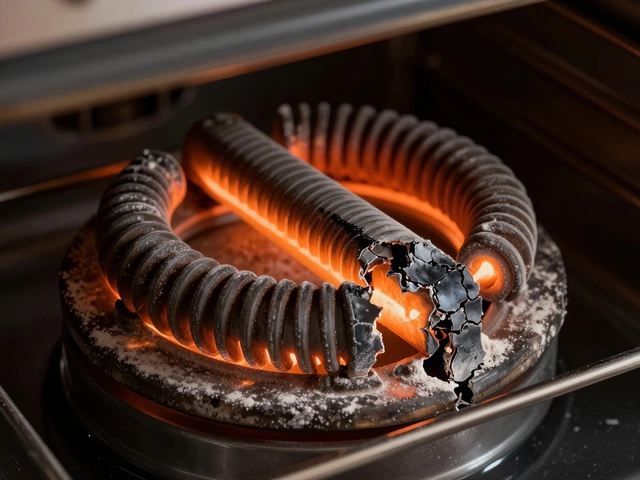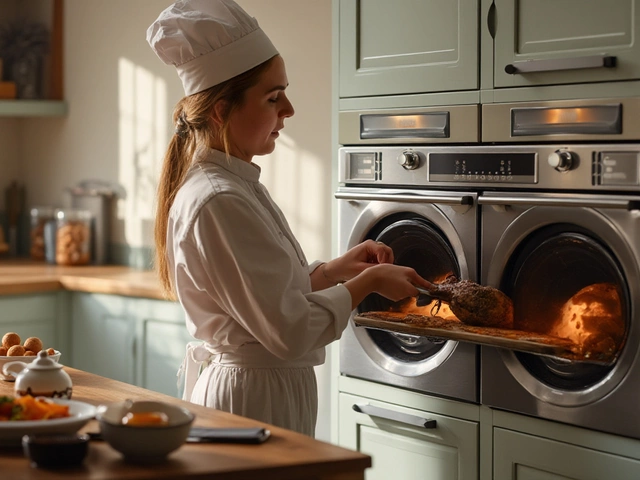If you've ever caught yourself wondering how long your range oven will keep churning out delicious meals, you're not alone. The typical range oven hits the 10 to 15-year mark, but that doesn't mean they're all created equal. Several factors come into play, like how often you use it and how well you maintain it.
Regular cleaning can go a long way in lengthening its life. Scrubbing away food debris and grease not only keeps it looking spick and span but also helps it operate smoothly. Little things like checking the door seals and replacing faulty heating elements can make a huge difference too.
But what if your oven's acting up? Persistent malfunctions might be a sign to either fix it or let it go. Choosing between repair and replacement hinges on the issue itself and how old your oven is. Keep in mind, newer models tend to be more energy-efficient, which can save you money in the long run.
Got more questions? Stick around as we dish out all the goods on keeping your oven in top shape and deciding when it's time to say goodbye to the old faithful.
- Understanding Range Oven Lifespan
- Signs Your Oven Needs Attention
- Handy Maintenance Tips
- When to Repair or Replace
Understanding Range Oven Lifespan
Thinking about how long your range oven is going to last can feel a bit like peering into a crystal ball. On average, though, most range ovens clock in an impressive lifespan of around 10 to 15 years. Of course, this number isn't set in stone and can vary based on a few factors.
First off, usage. The frequency of your family dinners directly impacts your range oven's longevity. The more you use it, logically, the quicker it might wear out. But taking good care of it can offset this!
Next up is maintenance. Just like cars need oil changes, your oven could use some TLC now and then. Basic cleaning and checking important parts—such as seals and knobs—can really help.
Now, when it comes to brands, there’s a bit of variance too. Some brands might offer sturdier models that cost a bit more upfront but promise a longer life, while others might churn out budget-friendly options.
Factors Influencing Lifespan
- Frequency of Use: Are you cooking up a storm every night or just heating leftovers?
- Quality of Brand: Reliable brands stand the test of time better.
- Maintenance: Staying on top of oven cleanliness and small repairs.
| Brand | Typical Lifespan (Years) |
|---|---|
| Brand A | 14 |
| Brand B | 12 |
| Brand C | 15 |
The key takeaway? Treat your oven well, and it'll return the favor. Regular cleaning, prompt repairs, and occasionally stepping back to assess its overall condition can keep your trusty kitchen companion around as long as possible.
Signs Your Oven Needs Attention
Noticing your range oven isn't quite the reliable workhorse it once was? There are some telltale signs that might mean it's time to roll up your sleeves or call in the pros.
Inconsistent Temperatures
If baking a cake has become something of a lottery, with the results coming out burnt one day and undercooked the next, your oven might not be maintaining the temperature properly. This is often due to a faulty thermostat or heating element.
Strange Noises
Got unexplained clunks or whirrs coming from your oven? Unusual sounds can mean internal parts are wearing out. Don’t ignore them because they usually get worse over time.
Electrical Issues
If your electric oven trips the circuit breaker or shows signs of electrical faults like flickering lights or failed controls, you might have internal wiring issues. It's crucial to address these right away for safety reasons.
Door Not Sealing Properly
A door that doesn’t close well can affect cooking performance. Heat escapes, which means food takes longer to cook and uses more energy, not to mention becoming a safety hazard!
Unexplained Smoking
Smoke that isn’t from recent spills or leftovers at the bottom of the oven suggests something's off. It could be due to electrical issues or internal parts overheating.
Excessive Energy Bills
Notice your energy bills have skyrocketed, but your lifestyle hasn’t changed? An older or inefficient oven might be the culprit. You might weigh the cost of repairs versus getting a more energy-efficient model.
| Common Issue | Potential Fix |
|---|---|
| Temperature Fluctuates | Check thermostat or heating element |
| Door Not Sealing | Replace door gasket |
| Electric Issues | Inspect wiring or control panel |
Keeping an eye out for these signs can help prevent small issues from turning into expensive, full-fledged problems. Whether it's something you can fix yourself or need a technician, acting fast can keep your oven running smoothly.

Handy Maintenance Tips
Keeping your range oven in tip-top shape isn't rocket science, but it does take a little elbow grease and a dash of know-how. Here are some practical maintenance tips to keep your appliance running smoothly for years.
Give It a Good Clean
First things first, cleanliness is key. Regularly clean your oven's interior to prevent buildup of food particles and grease. It’s best to use a gentle, non-abrasive cleaner so you don't damage surfaces. Simply unplug, apply your cleaner, let it sit, and wipe away with a soft cloth.
Check Those Seals
The gasket or seal around your oven door is crucial for keeping the heat in. Over time, these seals can wear out. A simple visual inspection can help – if it's cracked or frayed, consider replacing it. This little fix can improve efficiency and cook times.
Be Mindful of the Heating Elements
The heating elements are the heart of your electric oven. Make sure they’re always clean and free of debris. If they’re not working as they used to, or if you notice uneven cooking, you might need to replace them. Thankfully, replacing a heating element is a straightforward DIY task.
Address the Burned-Out Bulbs
It might seem minor, but a burned-out oven light can make it tricky to monitor your cooking without opening the door. Check the bulb regularly and replace it when it goes out with the right wattage and type for your oven.
Don't Forget About the Vent
An often-overlooked spot is the oven vent. Blocking it can trap heat and cause malfunction. Clear away any obstructions for better performance.
Regularly Inspect for Wear and Tear
It’s a good move to routinely check for any small issues that could become big problems. Keep an eye out for rust, weird smells, or unknown sounds. These can all be indicators that something isn't quite right.
| Maintenance Task | Recommended Frequency |
|---|---|
| Clean Interior | Every 3 months |
| Inspect Door Seal | Every 6 months |
| Verify Heating Elements | Annually |
| Replace Oven Light | As needed |
By regularly following these tips, you not only extend the life expectancy of your oven but also ensure it works efficiently and safely. Remember, a little extra attention today saves you from bigger headaches down the road!
When to Repair or Replace
Deciding whether to repair or replace your range oven is sometimes complicated, but there are some tell-tale signs that can make your decision clearer. Let's break it down.
Signs It's Time for a Repair
Before rushing to buy a new oven, think about these factors that indicate a simple fix might do the job:
- Heating issues: If your oven heats unevenly, it could just be a faulty heating element, which is usually a quick fix.
- Electronic glitches: Timers and control panels sometimes act up due to minor electrical problems that an electrician can easily repair.
- Door seal problems: A compromised door seal reduces cooking efficiency. It's usually just a matter of replacing the seal.
When to Consider Replacement
There comes a point when keeping the old oven alive just isn't worth it, perhaps due to age or cost. Here are some scenarios where replacing might be smarter:
- Frequent breakdowns: If you're calling for repairs often, the cumulative cost could outweigh the price of a newer model.
- Energy inefficiency: Older ovens typically consume more power. A newer, more efficient model saves on energy bills over time.
- Physical damage: Cracks, rust, or other irreversible damage to the oven structure is a good sign it's seen better days.
Cost Considerations
A good rule of thumb is the 50% rule: if the cost of repair is over half the price of a new electric oven, replacement makes better financial sense. Here’s a simple table you might find useful:
| Oven Age (Years) | Repair or Replace? |
|---|---|
| 0-5 | Repair |
| 5-10 | Depends on Condition |
| 10+ | Consider Replacement |
Keep an eye on the warranty, too. If repairs on a newer model are covered, then fixing might be your best course of action.
Weighing these options carefully will help you make an informed decision, saving you both money and hassle in the long run.




